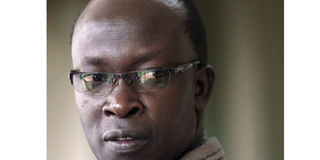Appeal court sets criteria on extradition of suspects

Former journalist Walter Barasa who wants to be extradited to The Hague court to clear his name on alleged witness interference. The Court of Appeal has ruled that it is the AG, and not the DPP, who has the powers to institute proceedings for extradition. PHOTO | FILE
What you need to know:
- The office of the DPP is deprived of extradition matters as it is not part of Kenya’s criminal justice system.
- The ruling is likely to influence how the courts handle the case of former journalist Walter Barasa who is battling extradition proceedings before the Court of Appeal.
It is the Attorney-General and not the Director of Public Prosecutions (DPP) who has the powers to institute proceedings for extradition of suspects wanted for trial outside the country.
In a precedent-setting decision, three Appellate Court judges court ruled that the Office of the DPP is deprived of extradition matters as it is not part of Kenya’s criminal justice system.
They further observed that the process of extradition is not part of the system of administration of criminal justice.
INTERNATIONAL LAW
The Judges added that the Extradition Act assigns responsibility to the AG to amend the schedule of extradition offences and to ultimately use his discretion to decide in each case whether a warrant for surrender should be issued and if so, to issue such warrant.
Justices Erastus Githinji, Hannah Okwengu and Jamila Mohammed ruled that it would be anomalous and quite inconsistent with international law relating to extradition for the DPP, who is not a member of the Executive or a political appointee, a professional who is independent of the executive in his decisions, to conduct part of Kenya’s foreign relations involving sovereignty, political, economic and other national interest considerations.
“Since it is the National Executive which conducts Kenya’s foreign relations, and the AG is a member of the National Executive, and is in charge of Justice Department by the Executive Order, Section 7(1) of the Extradition Act has in conformity with international law properly assigned the responsibility to conduct extradition to the AG,” the Judges said.
WALTER BARASA
The ruling is likely to influence how the courts handle the case of former journalist Walter Barasa who is battling extradition proceedings before the Court of Appeal.
Last week, the former Eldoret-based journalist sensationally pleaded to be taken to The Hague based court to clear his name.
Mr Barasa is to face three counts of corruptly, or attempting to corruptly influence witness P-0336 by offering him between Sh1 million and Sh1.5 million in order to influence him to withdraw as a witness.
He allegedly committed the offence between May 20 and July 21, 2013 and at or near Kampala, Uganda.
The ICC said he also corruptly, or attempting to corruptly influence a female witness P-0536 by offering to pay her and her husband Sh1.4 million so that she could recant her testimony, committed between May 20 and July 25, 2013 at or near Kampala.
BRIBERY
He is also accused of attempting to influence a female witness P-0256 by inducing her to meet witness P-0336 for the purpose of offering her a bribe in to influence her to withdraw as a prosecution witness.
The latest ruling by the judges was in response to an appeal filed by former Minister Chris Okemo and former Kenya Power and Lighting managing director Samuel Gichuru.
The request for extradition was forwarded to the DPP when it was a department in the AG’s office for advice.
Tribulations for the two started on June 6, 2011, when the AG received, through the British High Commission, a request of their extradition on behalf of the Attorney General of Island of Jersey.
JERSEY COURT
The DPP, which was then under the office of the Attorney-General, thereafter issued an “Authority to Proceed” to the Chief Magistrate pursuant to section 7(1) of the Extradition Act.
The extradition documents included the indictments filed by the Royal Court of Jersey.
Before the request, the Jersey court had issued warrants for the arrest of the two on April 8, 2010 and April 20, 2011.
Mr Okemo was the Minister for Energy between 1991 and 2001, while Mr Gichuru was the Kenya Power Lighting Company managing director between 1984 and February 2013, falling under the Ministry of Energy.
Mr Okemo was charged in the Royal Court of Jersey with 13 counts relating to the transactions in the accounts committed in the Island of Jersey July 1, 1999 and 2001.
And Mr Gichuru is charged faced 40 counts for offences allegedly committed under Jersey law between 1991 and June 28, 2002.





